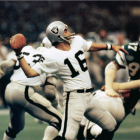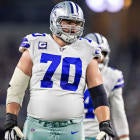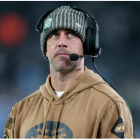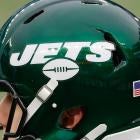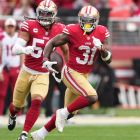
The Oakland Raiders were not supposed to win Super Bowl XV. Heck, they weren't even supposed to make the playoffs after failing to qualify the previous two seasons. They had the 16th-best odds to win the Super Bowl heading into the season, while the Eagles, the team Oakland would ultimately face in the deciding game, had the sixth-greatest odds.
Picked by many prognosticators to finish last in the AFC West, Oakland stumbled out to a 2-3 start. During that span, the team lost starting quarterback Dan Pastorini to a season-ending injury. The Raiders' replacement was 33-year-old Jim Plunkett, who seemingly came out of nowhere to lead Oakland to what was at that time the most improbable run in Super Bowl history. In becoming the first franchise to play in a Super Bowl in three different decades, the Raiders stunned the football world to win their second of three Super Bowls over an eight-year span.
Before the two teams face off this Sunday in Las Vegas, here are five facts about the Raiders' win over the Eagles in Super Bowl XV.

Pick Six Newsletter
Crafted By The Best NFL Experts
Get the day's big stories + fun stuff you love like mock drafts, picks and power rankings.
Thanks for signing up!
Keep an eye on your inbox.
Sorry!
There was an error processing your subscription.
The first wild card winner
A wild card team was initially added to the postseason in 1970 as part of the AFL-NFL merger. A second wild card team from each conference was added when the NFL expanded the regular season from 14 to 16 games. Starting that season, the four total wild card teams would play each other before facing division champions in the following round. During the first decade of the NFL's expanded playoffs, the 1975 Cowboys were the only wild card team to reach the Super Bowl. Dallas lost Super Bowl X to the defending champion Steelers, 21-17.
Oakland would ultimately become the first wild card team to win the Super Bowl after defeating the Eagles, 27-10, in Super Bowl XV. After its 2-3 start, Oakland finished the regular season with an 11-5 record behind the play of Plunkett, a powerful offensive line and a strong defense led by Ted Hendricks and Lester Hayes. Hayes won Defensive Player of the Year that season after recording a league-high 13 interceptions. Hayes had five more interceptions in the playoffs that included two picks (one returned for a touchdown) against former teammate Ken Stabler in Oakland's wild card win over Houston.
Hayes had two more interceptions in the Raiders' epic divisional round playoff win over the Browns, who were nicknamed the "Cardiac Kids" that season after winning a handful of close games during the regular season. The Browns' Cinderella season would end in heartbreak after Mike Davis intercepted Brian Sipe's end-zone pass to preserve Oakland's 14-12 victory. The Raiders then went to San Diego to face the Chargers, who edged Oakland for the division title during the regular season. While the Chargers explosive offense scored 27 points, the Raiders scored 34 points and used their bruising rushing attack to chew up the remaining moments of their second AFC championship win.
“By the definition, [they] were a team. They played best as a group.”
— Las Vegas Raiders (@Raiders) November 9, 2019
Some of the best, fiercest Raiders came together as a championship squad in 1980. They're No. 74 on the #NFL100 list of all-time greatest teams. pic.twitter.com/KljAN6bQLo
A regular season rematch
After a six-game winning streak, the 8-3 Raiders traveled to Philadelphia to take on the Eagles, who at 10-1 boasted the NFC's best record. In an extremely physical game, the Eagles prevailed 10-7. Plunkett was sacked eight times and received criticism from tackle Art Shell for holding the ball too long. Still, they left Philadelphia knowing that they could indeed stand toe-to-toe with one of NFL's best teams.
The Eagles lost three of their last four regular season games, while the Raiders won three of their last four games heading into the postseason. And after defeating Dan Fouts and the rest of the high-powered Chargers in the AFC Championship Game, the Raiders were confident they could beat the Eagles in Super Bowl XV. Oakland did so in emphatic fashion, racing out to a 21-3 lead before coasting to victory.
While he threw for more yards than his counterpart, Eagles quarterback Ron Jaworksi threw three interceptions and completed less than half of his pass attempts. And with Raiders nose tackle Reggie Kinlaw wreaking havoc on the Eagles' rushing attack, running back Wilbert Montgomery did more damage as a receiver than as a runner, catching a game-high six passes for 91 yards compared to 44 yards on 16 carries.
A key turning point in Super Bowl XV took place on the Eagles' third offensive possession. Trailing 7-0, Jaworksi hit Rodney Parker on a 40-yard touchdown. The play, however, was called back for an illegal motion penalty on wide receiver Harold Carmichael, Philadelphia's best player in 2020 Hall of Fame inductee. The Eagles punted two plays later, and the Raiders stretched their lead to 14-0 on an 80-yard touchdown five plays after the penalty. Down 14-3 at halftime, the Eagles were essentially kayoed after Plunkett hit Cliff Branch for a 29-yard touchdown on the sixth play of the second half. Philadelphia finally crossed the goal line at the start of the fourth quarter, but the Raiders responded with a 12-play drive that produced the game's final points, a 35-yard field goal by Chris Bahr.
Plunkett, Flores make NFL history
The first minority starting quarterback to win a Super Bowl, Plunkett joined former Cowboys quarterback Roger Staubach as the only two Heisman Trophy winners to also win Super Bowl MVP. Plunkett's future teammate, Marcus Allen (Super Bowl XVIII) and former Packers receiver/returner Desmond Howard (Super Bowl XXXI) later joined the list. Plunkett is the only eligible starting quarterback with two Super Bowl wins who is not currently in the Pro Football Hall of Fame.
The No. 1 overall pick in 1971, Plunkett failed to live up to expectations during his first five seasons with the Patriots. He signed with the Raiders in 1978 and attempted just 15 passes during his first two seasons in Oakland. His meteoric rise in 1980 was capped off by his MVP performance against the Eagles. He went 13 of 21 for 261 yards that included two touchdown passes to Branch and a then Super Bowl record 80-yard touchdown pass to Kenny King.
"It was a great feeling to finally accomplish something that everybody who ever gets in the NFL wants to do," Plunkett said in an NFL Films documentary.
Inducted into the Hall of Fame this summer, Tom Flores became the first person to win a Super Bowl as a player, an assistant coach and a head coach. (Mike Ditka eventually joined him on that list in 1986.) He won a Super Bowl as a player with the Chiefs in 1970 and was the Raiders' receivers coach when Oakland defeated Minnesota in Super Bowl XI. He is also the first minority head coach to win the Super Bowl.
Plunkett and Flores enjoyed a highly successful partnership. Plunkett went 38-19 in the regular season as the Raiders' starting quarterback and 8-2 in the postseason. The duo led the Raiders to a second upset win in the Super Bowl when they routed defending champion Washington in Super Bowl XVIII.
"As you look back, I think we're both proud of the fact that we came from, at that time, a minority group of people, who could take a lot of pride of what we accomplished," Plunkett said during a 2017 interview with NFL Films. "We're proud of the fact that we are Mexican American, where we came from, what we accomplished. And people can look up to that and strive to achieve for success in their own right, and that's all good."
Rod Martin's still-standing Super Bowl record
Oakland linebacker Rod Martin had two interceptions during the 1980 regular season. He had three interceptions in Super Bowl XV, a still-standing Super Bowl record. His first interception -- which took place on the game's third play from scrimmage -- set up the game's first touchdown. Martin's second pick set up Bahr's second field goal that extended Oakland's lead to 24-3 late in the third quarter. His third interception came on the Eagles' last offensive play from scrimmage.
"Rod Martin had a game for the ages," fellow former Raiders linebacker Matt Millen said. "He was everywhere. ... He played as good a Super Bowl as any defender has ever played."
Outside storylines
Five days before Super Bowl XV, 52 hostages were freed from Iran after 444 days of captivity. As a tribute to the hostages, the NFL distributed an estimated 80,000 yellow ribbons to fans that attended the game. A giant yellow bow was also attached to the face of the Superdome in New Orleans. Fans, media members and the pregame/halftime entertainers also wore yellow ribbons. Officials wore yellow wristbands during the game.

Much of the pregame hype was centered on NFL commissioner Pete Rozelle and Raiders owner Al Davis. The previous summer, the NFL declined to approve the Raiders' proposal to move from Oakland to Los Angeles. Davis responded by suing the NFL for violating antitrust laws. The Raiders eventually won the lawsuit, but it created a significant amount of friction between Rozelle and Davis. Despite that friction, Davis shook the commissioner's hand while accepting the Vince Lombardi Trophy after his team's decisive win.
"This was our finest hour," Davis said upon accepting the Vince Lombardi Trophy from Rozelle. "This was the finest hour in the history of the Oakland Raiders. To Tom Flores, the coaches and the great athletes, you were magnificent out there today."









